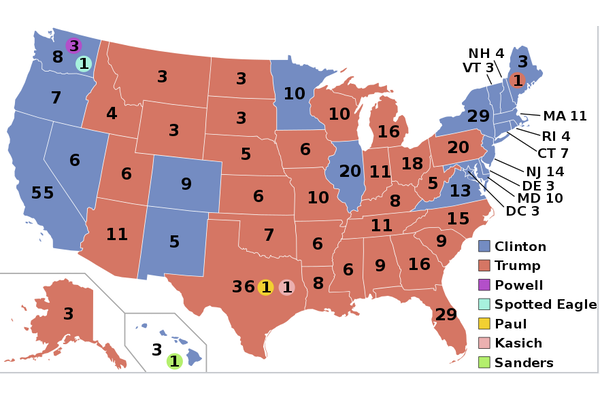Slavery and the Electoral College: One Last Response to Sean Wilentz

Map of the Electoral College for the 2016 presidential election
In his History News Network response to Akhil Reed Amar’s argument that the Electoral College was conceived as part of the defense of slavery in the United States, Sean Wilentz welcomed continuing the debate on the relationship between slavery and the Constitution. In his essay, Wilentz reiterated his view, first presented in a New York Times op-ed, that the Electoral College, while deeply undemocratic, was not part of a constitutional defense of slavery and he argued that Amar’s position is deeply flawed. In fact, he dismisses Amar’s position as “illogical, false, invented, or factually incomplete.”
As evidence to support his position, Wilentz points out that at least two of the leading slave states preferred an executive chosen by Congress to the Electoral College. Of course, the South would have more power in such a system because the 3/5 Clause boosted the South’s representation in Congress. Wilentz asserts “proslavery concerns had nothing to do with the convention’s debates over what became the Electoral College.”
Actually, as explained by Pierce Butler in Madison’s Notes on the Constitutional Convention, the selection of the Executive was part of a four-pronged defense of slavery. Butler, a South Carolina rice planter, was one of slavery’s strongest defenders and one of the largest slaveholders in the United States. He introduced the Fugitive Slave Clause into the Constitution, supported the constitutional provision prohibiting regulation of the slave trade for twenty years, demanded that the entire slave population of a state be counted for Congressional apportionment, and championed an Electoral College with voters selected by state legislatures. Such a system permitted wealthy white men to represent white women, landless whites, and enslaved Blacks.
Wilentz is correct that some Southern representatives thought an Executive chosen by the national legislature would more effectively defend state prerogatives including slavery and that some Northerners feared empowering a broad electorate. But that does not change the fact that with the 3/5th Clause in place, both proposals to select the Executive by the national legislature and to do so through a separate Electoral College, were designed to ensure the continued existence of slavery.
In the New York Times op-ed, Wilentz claimed that the Electoral College would not have effectively helped the slave states in Presidential Elections. But between 1801 and 1837, every President except two were slaveholders from a slaveholding state. The South held the Presidency for 28 of the 36 years. Despite Wilentz’s dismissal of the numbers, without the 3/5 Clause and the Electoral College, John Adams, not Thomas Jefferson would have been elected President of the United States in 1800. Even if the intent of the Electoral College was not to support slavery, though I believe the evidence shows it was, as Gary Willis argued in “Negro President,” Jefferson and the Slave Power (2003), it definitely entrenched slave power in the United States.
William Lloyd Garrison dramatically expounded a very negative view of the United States Constitution on July 4, 1854 when he publicly burned a copy at a rally sponsored by the Massachusetts Anti-Slavery Society. For Garrison the Constitution’s tolerance of enslavement condemned it as “a Covenant with Death, an Agreement with Hell” and he and his followers refused to participate in the electoral process because it gave legitimacy to the illegitimate.
In an 1832 editorial in The Liberator, Garrison elaborated on his position with greater detail. “There is much declamation about the sacredness of the compact which was formed between the free and slave states, on the adoption of the Constitution. A sacred compact, forsooth! We pronounce it the most bloody and heaven-daring arrangement ever made by men for the continuance and protection of a system of the most atrocious villainy ever exhibited on earth.” “Such a compact,” according to Garrison “was, in the nature of things and according to the law of God, null and void from the beginning.”
In March 1849, Frederick Douglass, who later modified his views, called the United States Constitution “a most cunningly-devised and wicked compact, demanding the most constant and earnest efforts of the friends of righteous freedom for its complete overthrow.”
The debate over the meaning of the Constitution and its origins as a pro-slavery document during the Abolitionist battle to end slavery in the United States gives us some clues to its deeper meaning as well as weapons in our own struggle to preserve what may be a fragile democracy in the United States today. As historians and public figures, we have an obligation to defend democratic institutions and expose vestigial anti-democratic elements like the Electoral College that threaten democracy, which includes a careful examination of their origin and history.